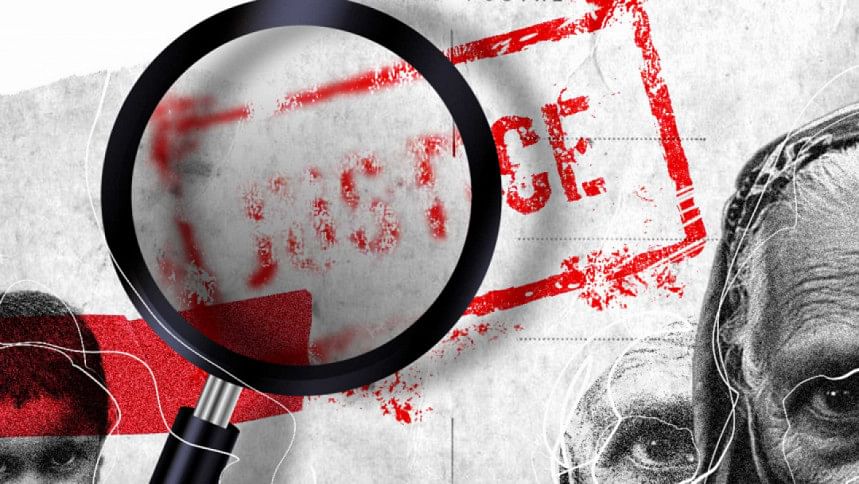If justice had a face now, it would be of victims wronged twice

The idea of a justice system hinges on people's faith in its ability to offer fair solutions. So justice, as the saying goes, should not only be done, but be seen to be done as well, so that people's faith in it is kept intact. But what if the system is broken and people can no longer trust it to guide them to a just solution? Can they still be expected to show unquestioning allegiance?
Questions such as these are getting louder in Bangladesh as people increasingly lose their faith in the formal justice system. You see its manifestations in frequent denunciations of how the system is failing to protect the helpless, growing support for extrajudicial executions of rapists and thugs, growing acceptance of mob justice, victims' preference for out-of-court settlements, or their unwillingness to report crimes or file cases—all signs of discontent with a crumbling justice system. But when the families of victims surrender to their fate and say, "We don't want justice," it means the system has hit rock bottom.
We've heard variations of this expression by frustrated citizens on a number of occasions, most recently after last week's clashes between shopkeepers and Dhaka College students in the New Market area. The clashes, which we're still struggling to make sense of, took the lives of two ordinary individuals. One of them was Nahid Mia, a 19-year-old who was involved with neither of the feuding parties. Yet, armed political thugs masquerading as students mercilessly hacked him to death. The other victim was Mohammad Morsalin, a 24-year-old shop staffer, who was hit by a brick during the clashes and died at Dhaka Medical College Hospital (DMCH). In comments later carried by the media, both their families refused to seek justice, because "what's the point of seeking it? Whom shall we seek it from?"
This is not the first time that we've had families of victims saying they don't want justice. Last month, when Samia Afran Prity, a college student, was fatally injured by misdirected shots fired during an attack on a political leader in Shahjahanpur, Dhaka, her father, too, had the same thing to say. "Where would I seek justice? There is no justice here, nor do I have the ability to pursue it," he lamented, as he waited for his daughter's body in front of the DMC morgue.
Victims or their families refusing to pursue their case in a court of law, out of a sheer sense of helplessness, is perhaps the brightest of all red lines for any justice system. We've had the warning signs for quite some time, though. Remember the reaction of the professor-writer Abul Quasem Fazlul Huq, whose son, secular publisher Faisal Arefin Dipan, was hacked to death by Islamic extremists in October 2015? He famously said that he didn't want justice, because "even if I want it, there will be none," pointing to the futility of long-drawn-out legal battles. Even though eight extremists were sentenced to death in this connection in 2021, Fazlul Huq, in a recent interview with The Daily Star, repeated his belief that long delays defeat the purpose of a justice system.
In case it's not still clear, when people say they don't want justice, what they really mean is that they don't want to go through the motions of pursuing it through a process that not only does not guarantee success, but may very well leave them exposed to further trouble. Thus they are wronged twice, first by a criminal and then by the justice system. A combination of factors is responsible for this, including long delays in trials (of which there are too many instances to recount), inadequate and often costly legal services, risks of harassment for giving testimonies, lack of security for victims and witnesses, etc. Even those fortunate enough to see a verdict, and its execution, must go through a series of obstacles starting from the filing of a case and its investigation until the very end of the road.
Ultimately, the question that looms large is not if you're on the right side of the law, but if you're on the right side of power. For only the powerful, or the able, or the lucky can survive this process. The staggering number of cases pending with different courts will attest to that. Just imagine: as of December 31, 2020, over 3.9 million cases were pending with courts across Bangladesh. Between January 1 and December 31 in 2020, only 739,000 cases could be disposed of. At the High Court, around 450,000 cases were pending as of December 31, 2020. About 200,000 cases are being added to the national backlog each year. These numbers, one can safely assume, will have swollen after the Covid-induced closures and disruptions.
We hear boastful claims of giving no quarter to criminals. We hear talks of appointing more judges and other court officials to dispose of pending cases, as if not having enough of them is the main problem. Rarely, however, is there a serious undertaking to modernise the system and remove existing roadblocks—systemic, political and social—to swift, unobstructed legal pursuits.
For the ordinary justice-seekers, two of these barriers have a particularly deterring effect: lack of protection for witnesses and complainants, and lack of financial means to ride out lengthy legal procedures. Protection can be extended through legislation and as part of regular police activities. Neither is guaranteed in Bangladesh, as there is currently no witness/victim protection act, nor are police in the habit of proactively defending ordinary victims and witnesses, making the latter vulnerable to threats, intimidation and duress. And despite there being a National Legal Aid Services Organization, and the Legal Aid Services Act, 2000, governmental legal aid continues to be elusive to most people.
Should they cede their right to justice, then? Should they suffer silently, while their rights and dignity are being trampled on with carefree abandon? Unfortunately, as more people grow disillusioned with the justice system, the risks of crimes, chaos and divisions in society will grow as well. If people continue to be deprived of timely and adequate legal services, they will look for extrajudicial solutions and even take the law into their own hands.
This cannot be a desirable outcome for anyone. The authorities must treat people's rejection of the justice system as the ticking time bomb that it is. They must do everything to restore their faith.
Badiuzzaman Bay is an assistant editor at The Daily Star.

 For all latest news, follow The Daily Star's Google News channel.
For all latest news, follow The Daily Star's Google News channel. 








Comments